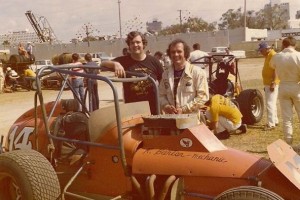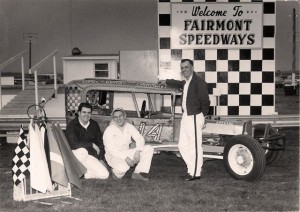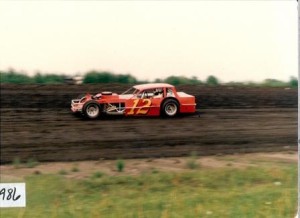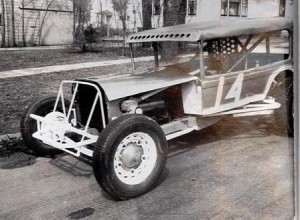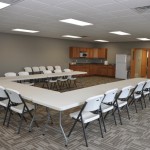By Chad Meyer
Ron Barton’s racing career started when he met up with fellow Algona natives Jim Edgington and Roger Hendrickson. In 1964 the trio partnered on a jalopy and began racing at the track in Algona. The next year they made the jump to the modified class and soon the legend of all three would soon be born.
Each of the three partners brought something unique and the entire fed off each other. Barton had a knack for putting engines together and getting good power out of each creation. Edgington’s skills as a race car driver blossomed during their switch to modifieds and according to Barton the unsung hero of the team was Hendrickson. Barton felt there wasn’t anything he could assemble or build for a race car and whatever ideas they come up with to make the car faster, they could collectively make it happen.
From 1965 through the early 1970’s the trio raced their modified at Algona plus the Jackson and Fairmont speedway’s in Minnesota and were a force to be reckoned with. In 1965, Barton, Hendrickson and Edgington raced frequently Lamont Wellendorf’s tracks which included Algona, Mason City, Cresco and Webster City plus racing at Jackson Speedway.
In addition to countless feature wins, some of the racing accomplishments of the team included winning the Fairmont Raceway champion ship in 1967. That year Jim Edgington and Les Wildin shared the Hendrickson/Barton car with Edgington earning the track championship in Fairmont and Wildin winning the track championship in Jackson using the same car.
The trio had a successful season at Jackson Speedway in 1970, winning yet another track championship and the fast Minnesota half mile speed plant. Other highlights during that era included winning the Minnesota State Fair modified (asphalt) championships in 1968, 1969 and the Tri-State (Spencer, IA) championships in 1966, 1967, 1969, 1970.
After 1970, the team stopped fielding race cars as Edgington went to pursue his career in sprint cars and as a track promoter. Hendrickson began pursuing other interests as did Barton, who ultimately began his own engine shop in Fairmont, Minnesota.
The team left behind a legacy of modified domination that was unrivaled by most teams of the day. Often they were on the leading edge of innovation of the time as many rules makers were forced to address their creations. Barton recalls they were the first modified team to run dual right rear tires on heavy, muddy race tracks. This innovation was quickly outlawed as it provided a tremendous advantage.
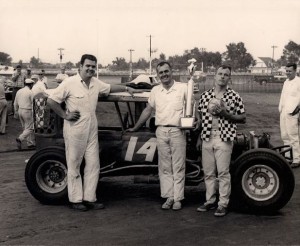
Ron Barton, left, in victory lane after a win at the Clay County Fair in Spencer, IA. Driver Jim Edgington holds the trophy, while Roger Hendrickson holds his hat.
Barton and Edgington reunited one last time in the early 1970’s when late models stormed the half-mile oval in Fairmont. At the time big-block engines ruled dirt late model racing, however as happened so many other times, Barton’s ingenuity created a different approach to fielding a car. Barton’s plan called for a small block Chevrolet engine that ran higher RPM’s placed in the frame rails of the lightened late model with a suspension designed to run the high side of the speedway. Edgington recalls that the combination worked, resulting in strong finishes with the car.
One of Edgington’s favorite memories occurred at a special high paying event, in which all the hot shoes were at the track. When the track was heavy, Edgington said the car would develop a big push and not turn. Edgington was determined to make the car turn and blasted into the third turn, set the car and then promptly hit the wall. Needless to say the driver was embarrassed and Barton was mad. Edgington convinced his owner to fix the car so he could make amends. Barton got the car fixed just in time for the team to start dead last in the 24 car field. The race went 30 laps without a restart and when it was done Edgington got the car to second, behind race winner Dave Chase. Edgington reports that his owner was in a much better mood after the run to the front.
Another highlight that year was at a special event in Redwood Falls, Minnesota. Edgington was racing his sprint car at another track and Barton had racing legend Jack McCorkell behind the wheel. The super sub drove like Edgington told him…take it into the corner as hard as you can because the car won’t spin out. McCorkell did and went to win the race.
In 1975, Ron started Barton Engines, a machine shop that specialized in building racing engines. This successful business provided the power and machine work for many local racers.
After taking a few years off from fielding a race car, Barton’s desire to resume racing began again in 1984 as he fielded an IMCA modified for Fairmont racer Gary Schumski. At the conclusion of the 1985 season, Barton decided to make and struck a deal to put Burt, Iowa driver Bob Weber behind the wheel of the IMCA modified.
The combination of Barton’s car, and Weber’s driving was a strong one and the highlights were numerous in 1986. They won multiple times in Fairmont and Mason City, including a stretch of four wins in a row at Mason City. At the fall NASCAR 50 modified race at Webster City, after starting at the rear of the B-feature and transferring to the main, Weber lined up deep in the field for the A-feature. He quickly moved to front, passing Wayne Larson for the win.
Barton recalls August of 1986 when they competed in the first ever IMCA modified race in Algona during the Kossuth County Fair. With both Barton and Weber being natives of Kossuth County, they were excited for the chance to race in front of the hometown crowd.
The first modified event in Algona belonged to Barton’s car as Weber won his heat, trophy dash and lapped everyone but the second place finisher in the A-feature for the win. They rounded out the season qualifying for the IMCA Supernationals held at Knoxville Raceway.
In addition to amassing feature wins, Barton recalls finding creative ways to confound his fellow racer who claimed his engines over the years. He says everyone assumed that since he ran an engine shop, the motors in his cars were top of the line. Barton insists that this was rarely the case as in usually he pieced motors together from parts around his shop.
Often, Barton would find ways to make the motor work in his car, but once it was claimed and the other driver tried to tear it down to see what was in it, it often wouldn’t run well. This resulted in more than a few phone calls from IMCA inquiring what was going on. Barton says his response was usually laughter on his end.
After the 1986 season, Barton decided to stop fielding race cars to concentrate on the engine shop. Barton closed the shop in 1990 in order to move and retire to Arkansas.
Barton passed away October 25, 2013. His wife Janice resides in Arkansas.
